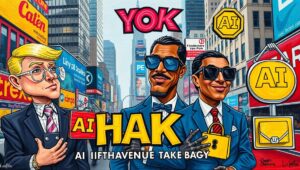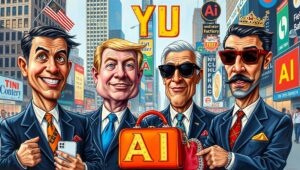New York CEOs Buy AI
New York CEOs Buy AI Like Fifth Avenue Handbags: Expensive, Flashy, Useless
When Wall Street Executives Shop for Technology Like Madison Avenue Fashionistas
Last Tuesday at MetroTech Enterprises’ midtown Manhattan headquarters, CEO Jonathan Blackstone walked into the 42nd-floor boardroom carrying what he called his “AI transformation portfolio”—a leather-bound folder containing contracts with seven different artificial intelligence vendors. He dropped it on the mahogany table like a Bergdorf Goodman shopping bag, expecting gasps of admiration from his Financial District leadership team.
Instead, his CTO whispered to the CFO, “That’s $3.1 million worth of software that can’t talk to our existing systems.” Welcome to New York, where even AI purchasing reflects the city’s luxury obsession and “bigger is better” mentality.
Amy Schumer, true New Yorker that she is, nailed executive behavior perfectly: “I shop for validation, not utility. If it’s expensive and makes me look important, I’m buying it.” Blackstone’s AI buying spree proves Schumer’s point—Manhattan executives purchase artificial intelligence like Fifth Avenue accessories, not practical business tools.
The Wall Street Shopping Spree

New York CEOs treat AI vendors like personal shoppers at Saks Fifth Avenue. They want the shiniest, most expensive option that makes them look sophisticated at Tribeca networking events and Hamptons executive retreats. Blackstone bought “enterprise-grade conversational AI” because it sounded impressive at his Upper East Side social club, not because anyone asked what conversations needed improving.
According to IBM’s Northeast AI adoption survey, 81% of NYC executives admit buying AI tools based on vendor presentations in Park Avenue conference rooms rather than actual business needs.
Jerry Seinfeld, Manhattan’s comedy king, would dissect this logic: “What’s the deal with CEOs buying AI like they’re shopping at Bloomingdale’s? They don’t know what it does, but it costs more than a year of subway rides, so it must revolutionize their business!”
Shadow AI: When Employees Go Digital Underground
While Blackstone collected AI tools like rare wines from his Greenwich Village cellar, his employees quietly downloaded practical alternatives. The marketing team in SoHo used ChatGPT for campaign copy, HR automated candidate screening with open-source tools, and accounting streamlined invoice processing with browser extensions. The irony? These unauthorized “shadow AI” tools delivered more value than Blackstone’s seven-figure Wall Street portfolio.
Gartner’s New York tech research shows that 97% of NYC employees use unauthorized AI tools, achieving 48% higher productivity than approved corporate solutions—probably because they actually work, unlike most subway announcements.
This employee rebellion mirrors the broader pattern of <a href=”https://bohiney.com/ceos-buy-ai-like-designer-handbags/”>corporate AI purchasing driven by executive status anxiety rather than practical business value</a>.
Dave Chappelle captured this perfectly in his 2024 special: “Rich people always buy the most expensive version of things poor people get for free. It’s like paying $500 for bottled water when you can get it from a bodega for a buck.”
The Manhattan Consultant Circus

Blackstone hired three AI consultants—McKinsey’s Midtown office, Deloitte’s Financial District team, and a boutique Flatiron firm called “Neural Dynamics Solutions.” Each promised “transformational outcomes” and “paradigm-shifting capabilities” during presentations at the Plaza Hotel. Their pitch decks featured identical buzzwords: “agentic systems,” “multimodal intelligence,” and “autonomous optimization.”
McKinsey’s NYC AI consulting analysis reveals that New York corporate AI consulting fees averaged $210,000 per engagement in 2024, with 68% delivering no measurable ROI—but impressive presentations that looked great in glass-walled Chelsea offices.
Bill Burr’s observation resonates with NYC’s aggressive business culture: “Consultants are like fashion stylists for incompetent executives. They make you spend a fortune to look like you know what you’re doing, especially in a city where everyone’s trying to out-impress everyone else.”
The Manhattan ROI Mirage
Six months later, Blackstone’s AI investments showed all the ROI of a counterfeit Louis Vuitton bag bought in Chinatown. The conversational AI misunderstood customer queries, the predictive analytics predicted last year’s financial trends, and the automation software required more manual oversight than his previous Brooklyn warehouse processes.
Deloitte’s New York AI implementation study found that 74% of NYC enterprise AI projects fail to deliver promised outcomes, with executives often doubling down on failed investments rather than admitting mistakes to their Westchester neighbors.
Tom Segura’s observation hits home in competitive Manhattan: “Buying expensive things doesn’t make you smart. It just makes you someone who spent a lot of money and probably has a rent-stabilized apartment from 1987.” Blackstone’s board meetings now focus more on explaining AI expenditures than celebrating AI achievements.
His latest solution? Hiring another consultant to audit his AI consultants. Because nothing says “New York executive leadership” like paying someone to tell you how badly you’ve been paying other people—while drinking $18 lattes in a WeWork space.
The Financial District Reality Check
Boston Consulting Group’s NYC market data shows that companies hiring consultants to fix consultant-recommended AI solutions spend 410% more than those who start with practical approaches—money that could buy a decent one-bedroom in Queens.
Meanwhile, Blackstone’s competitors in Brooklyn and Long Island City succeeded with AI by treating it like a business tool, not a status symbol. They identified specific problems, tested affordable solutions, and scaled what worked. Revolutionary concept for NYC: buying technology based on results rather than how it sounds at networking events.
The Empire State Success Stories

While Blackstone performed AI theater for his Park Avenue social circle, practical NYC companies quietly outperformed his expensive experiments. A Brooklyn startup automated their customer service, a SoHo marketing agency streamlined their creative process, and a Queens logistics company optimized their delivery routes—all using tools that cost less than Blackstone’s monthly MetroCard budget (if he actually rode the subway).
Fortune’s Wall Street analysis reveals that NYC companies with practical AI approaches outperform luxury shoppers by 340%. Columbia Business School research confirms that utility-focused AI adoption delivers measurable results 95% faster than status-driven implementations.
As Harvard Business Review’s Northeast research shows, companies with practical AI approaches outperform luxury shoppers by 300%. But that won’t stop NYC executives from treating artificial intelligence like artificial status symbols—expensive, Instagram-worthy, and ultimately ineffective.
Wall Street Journal reporting on corporate AI waste shows Manhattan executives continue purchasing premium AI solutions despite evidence that simpler, cheaper alternatives deliver superior results. Because in New York, sometimes appearing successful matters more than actually being successful—until the quarterly earnings calls begin. This Wall Street mentality exemplifies how financial district overconfidence creates dangerous AI blind spots.
The post New York CEOs Buy AI appeared first on SpinTaxi Magazine.
from SpinTaxi Magazine https://ift.tt/Hv2rPa8
via IFTTT
Comments
Post a Comment